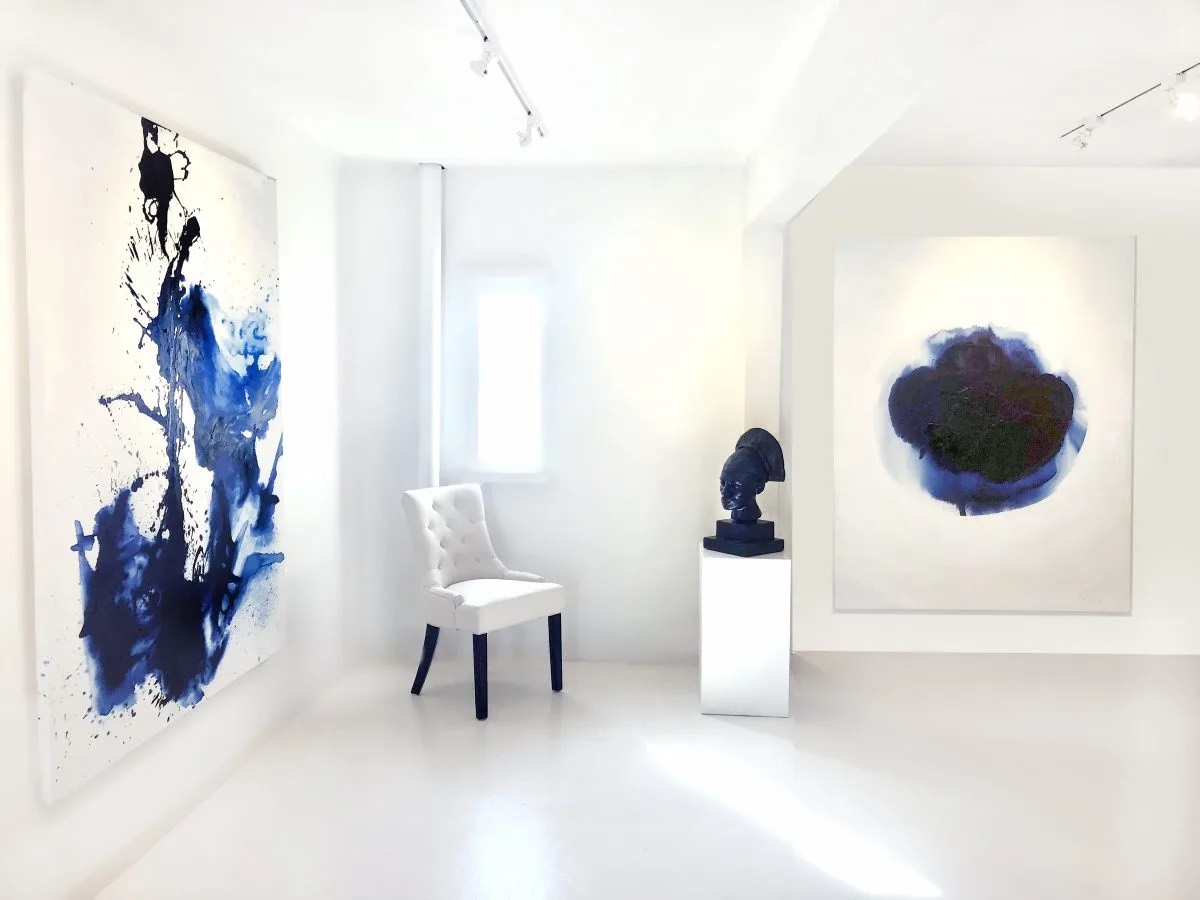Threading Metaphor with Tenacity at Santa Barbara’s Silo118 Gallery
Toni Scott’s New Exhibit Skillfully Connects History to the Present

Tenacity, Toni Scott’s exhibition currently on view at Silo118 gallery, is described by curator Bonnie Rubenstein as “a visual narrative embodying triumph of the human spirit.” Composed of four components — “Bloodlines,” a series of indigo portraits connected to her ancestral stories; “Wash(ed) Pieces,” touching the fragile connection of history to the present; “Indigo Sacred Water Paintings”; and “Sculptures” — the work represents Scott’s ancestral lineage and its connection to the human spirit.

When I ask Scott about “Bloodlines,” a large piece with warmer colors than her other indigo work, she mentions asemic writing to explain the patterned red that covers most of the painting. To illustrate the concept, she takes a pen and scribbles on a piece of paper. Seeing the signs form, I’m surprised. For a second, I think Scott, like me, writes Arabic. But she doesn’t. She has tapped into something that predates the Semitic language I grew up with, even language in general. As a text-based artist, I knew our species had evolved to identify crossed lines faster. Indeed, in the primal savannah, this meant something noteworthy had occurred: Someone like us might have tried to communicate the presence of danger or opportunity.
Scott believes memory has traveled with us — or within us — transported by something older than words, even older than meaning. Science established that our bodies carry trauma. Scott’s work demonstrates how the wealth of the collective is also held in our beings. She shared with me how long her “meditation” paintings took to achieve. Despite them being “simple” circles, Scott explains how it took her entire career to drip the blue just like so. The result is a feat: The thickness of textured paint combined with the circular form is an ode to the complexity of our breaths. Fittingly, Silo118 gallery chose to hang three of these — an invitation to take three breaths as you visit the show.
This edition of ON Culture was originally emailed to subscribers on August 13, 2024. To receive Leslie Dinaberg’s arts newsletter in your inbox on Fridays, sign up at independent.com/newsletters.
Reading Scott’s work as just a cunning abstraction would be missing the enormity and power of the spatiotemporal conversation she’s initiating. Speaking to Scott, a citizen of the Muscogee Creek Nation and of African and Native American descent, I could feel the reverence and seriousness with which she held her lineages. Speaking to her felt like speaking to more than just her. It’s clear she is aware, moment to moment, of the responsibility her art wields. And her work passes that awareness on in the most intimate way: Scott’s work is a sensual ritual. The paint crevasses in “Galaxy” or “Earth Sacred Circle” are an invitation into the mystery of the worlds we inhabit. The threads holding the cardboard in “Washed” are the very physical reconnection to self and community we long for.

Scott deconstructs then pieces together the complexity of our universal heritage and the intricacies of our personal journeys. She is sowing lost and loose parts. One of Scott’s masterpieces, “The Forgotten,” is a 24-foot slave ship replica with a hull made up of more than 500 indigo-tainted images of slaves. Scott’s work is not a Frankensteinian enterprise, however. The point is not to preserve the past immaculately or revive it forever, the way Victor Frankenstein was pursuing immortality. Rather, this is an invitation to listen carefully. There is a precious lesson our ancestors are whispering from beyond the fray. None put it as well as Scott’s mother, whom she quotes: “I’m still here, and you can still be here.”
Artists embrace the abstract for a variety of reasons. Scott’s shedding of representation fits her philosophy — and personality — perfectly. Her art is an imprint of the unfathomable, a capturing of surrender, an ode to resilience, and a dialogue with the unsayable.
4·1·1
Tenacity by Toni Scott, is on view at Silo118 Gallery (118 Gray St.) through August 7. Gallery hours are Thursday-Saturday from noon-5 p.m. and by appointment. Call (301) 379-4669 or visit silo118.com.




You must be logged in to post a comment.